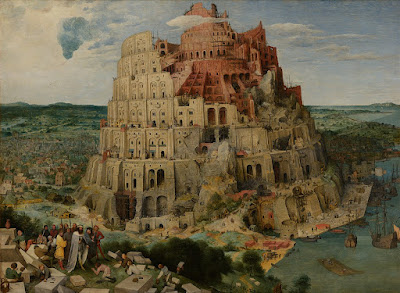 |
| The (Great) Tower of Babel, Bruegel the Elder, 1563 |
What is the difference between building Zion and building the Tower of Babel, when both stories are about trying to build our way to heaven? How do we know which work we are engaged in? We can know by whether or not we are listening to each other.
The people in the Old Testament were trying to get closer to God. I doubt we are supposed to take the story literally, that these people were actually dumb enough to think they could build a tower high enough to reach heaven, but there is good symbolism there.
"'Go to,' the people said, 'let us build us a city and a tower, whose top may reach unto heaven; and let us make us a name, lest we be scattered abroad upon the face of the whole earth.' And the Lord said, 'Behold, the people is one, and they have all one language; and this they begin to do: and now nothing will be restrained from them, which they have imagined to do. Go to, let us go down, and there confound their language, that they may not understand one another's speech.'" (Genesis 11:4)
In today's polarization, we are likewise confounded in our language. Sometimes, we legitimately do not understand one another's speech. When I talk with someone about certain political issues, I sometimes wonder if we are speaking in foreign tongues. So many things break down in translation. "Freedom." "Common good." "Rights." "Responsibility." We have lost the ability to communicate different perspectives with much degree of comprehension or common ground, and I appreciate that it is as much my fault as anyone else's.
Why would God confound us, members of Christ's church trying to build His kingdom on the earth? Sometimes, I think, it is because we have forgotten that we are building Zion where there are "no poor among [us,]" and have instead been building a tower of Babel in its place.
For a long time, and emerging out of a complicated cultural framework in the early 1900s, we had at last developed a solid core name to be known by, an unofficial "Mormon" identity that involved a certain culture, politics, language, and which abided by grammatical rules of what it meant to speak properly about being a latter-day saint. Those who didn't speak that language were, to our detriment, often pushed out. Our identity eventually became less and less about our belief in Christ and his gospel, and more to mean a certain political orientation and certain set of social expectations. At the time, it was easy to work together this way, all of us predominantly located in the intermountain West and superficially united in the same cultural language. But the polarization of our world has changed all that. It has pointed us to the fracture lines in our foundation. Like the Salt Lake City Temple, we need a renovation.
As we internationalized and faced more complex social issues at home, our makeshift language that we constructed as a defense against the world "lest we be scattered," lacked the vocabulary to move forward. We became mired in an identity that tends toward exclusivity rather than inclusivity. From here on out, if we are going to move forward we are going to have to adapt and focus on our common faith in Christ regardless of our social or political views. We need to value our differences, instead of marginalize them. In short, we are going to need to learn to speak one another's languages.
In the day of Pentecost, there was an outpouring of the sign of the gift of tongues. I believe we need this gift now more than ever. Not necessarily literal languages, but we need ways to interpret each other's differences with edification and rejoicing. Every day I lack this gift! But with each of us and our thick pioneer accents that hail from a multitude of different motherlands, we must learn to understand one another. Our ways of gesturing and communicating will vary depending on our life's experiences and a variety of political and social backgrounds, but taking time to listen to someone who speaks differently is going to be necessary work. It will enrich our church with diversity. It is the gift of interpretation of tongues. Without it, there will be no Zion, only the Babel of the 6:00 news.
The common language, the one we shall never throw away because it is the everlasting alphabet of our Savior, is the gospel of Christ. It is the language of Zion, the means to make a society consist of the "pure in heart" and where there are truly no poor among us. Christ's gospel language demands a rhetoric of bold defense for the most vulnerable among us, rather than focusing on ourselves. Christ's gospel is the language of service, inclusion, and love. Without learning to listen with love, our work will look less and less like Zion and more and more like the Tower of Babel, or perhaps even like Lehi's vision of the great and spacious building.
No comments:
Post a Comment